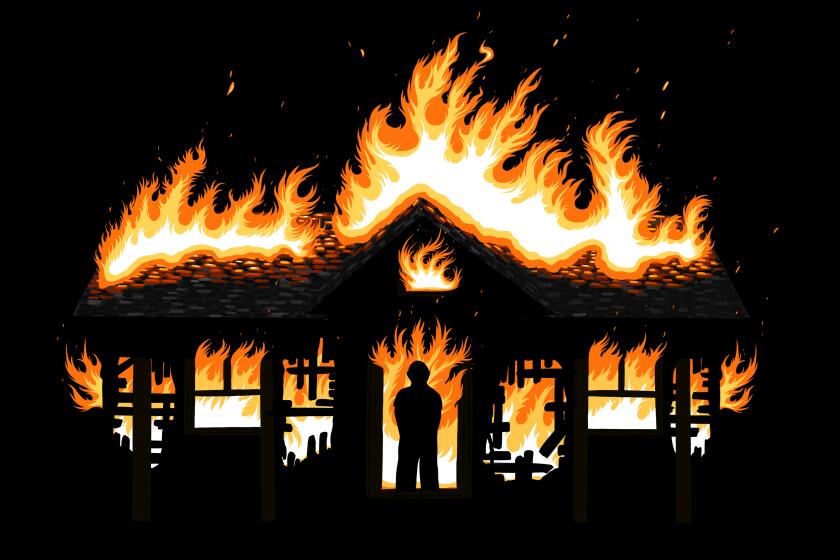
Soon after law school, Wendy Ramirez found herself teaching Spanish part-time to mostly white professionals while based in Washington, D.C.
As someone who felt “the shame” for not speaking “professional Spanish,” Ramirez gained more confidence in the language as she worked on immigration reform as a legislative assistant for then-Rep. Xavier Becerra and as she oversaw elections in Mexico, El Salvador and Guatemala for the National Democratic Institute.
Language and culture are intertwined, and many Latino Americans are seeking to learn or improve their Spanish to form deeper connections with family and their own identities.
She decided it was time to help other Latinos who’ve struggled with Spanish, and issued a call-out on Facebook. From that emerged Spanish Sin Pena, an online space co-founded with Jackie Rodriguez — who previously worked at a health advocacy nonprofit supporting immigrant families — that goes beyond grammar and pronunciation as they help Latinos reclaim the language.
They delve into layers of guilt for not knowing the language, asking questions like, “Why do you feel like you should speak Spanish? “Whose fault is it that you don’t or is it really anyone’s fault?” They cope with a feeling of “letting down my community.” And they embrace the use of Spanglish because, they say, “it’s part of our identity” and “it allows us to start where we’re at.”
These issues are explored in a new Pew Research Center analysis that highlights how Latino identity is intertwined with views about Spanish. It found that about half of U.S. Latinos who don’t speak Spanish have been shamed by other Latinos because of it. But, despite this finding, most Latinos in the U.S. say speaking Spanish is not necessary to establish Latino identity.
Learning Spanish wasn’t part of a quest for identity. I was proud of this fact; that I was pursuing fluency on my own terms and not for cultural credibility.
Mark Hugo Lopez, director of race and ethnicity research at the Pew Research Center, points to this “tension that exists among Latinos about the Spanish language.”
On one hand, Pew found that 85% of all Latinos — including foreign and U.S.-born — say it’s important for future generations of Latinos in the U.S. to speak Spanish. But on the other hand, most Latino adults (78%) say it is not necessary to speak Spanish to be considered Latino.
The Pew analysis was released Wednesday and surveyed 3,029 U.S. Latino adults between Aug. 1-14, 2022.
It found immigrant Latinos are more likely than U.S.-born Latinos to say it’s important that future generations of U.S. Latinos speak Spanish. And among U.S.-born Latinos, this importance decreases with later immigrant generations. Latino Democrats were slightly more likely than Latino Republicans to say it’s important for future generations to speak Spanish.
Most U.S. Latinos speak Spanish, with 75% saying they can carry on a conversation in Spanish pretty well or very well, according to Pew. However, not all do, with 24% of all Latino adults saying they can only carry on a conversation in Spanish a little or not at all.
Among third- or higher-generation Latinos, a larger share are not Spanish speakers, with 65% saying they cannot carry on a conversation well in Spanish, the Pew found.
For many Latinos, the inability to speak Spanish can result in others shaming them or making jokes, the Pew study notes, pointing to recent examples such as the viral video of the young Mexico soccer fan who was ridiculed when he struggled to answer a reporter’s questions in Spanish.
Critics lamented about a “missed opportunity” in not teaching the boy Spanish at home. “RAISE YOUR KIDS NOT TO BE “YO NO SABO,” a man said in a viral tweet.
‘Language isn’t the only thing that defines who we are and our relationship to our Mexican heritage.’
Other higher-generation Latinos who struggled with Spanish pushed back against the harsh reactions, noting that their parents grew up in the U.S. at a time when children would be punished for speaking Spanish.
Pew found that of the U.S. Latinos who have a limited ability to converse in Spanish, 54% say another Latino has made them feel bad for it.
According to Pew, 40% of U.S. Latinos say they often hear family and friends make jokes or comments about other Latinos who can’t speak Spanish.
Bilingual Latinos (47%) are more likely than English-dominant or Spanish-dominant Latinos to say these types of comments happen often, Pew found.
Age also plays a role in this.
Half of young Latino adults — those ages 18 to 29, the least likely age group that can carry on a conversation in Spanish — say these jokes or comments happen extremely or very often, significantly higher than all other age groups.
It’s the first time the Pew has asked about Latinos experiencing shame if they don’t speak Spanish, as well as about the prevalence of jokes targeting Latinos who don’t speak Spanish.
The reason?
“It’s probably because of the ongoing conversations around language, and the ways in which you find many Latinos evaluating other Latinos as who is perhaps more Latino in this to them than others,” Lopez said.
Pew also notes that a majority of U.S. Latinos (63%) say they use Spanglish — a combination of Spanish and English — at least sometimes, including 40% who say they do so often.
Bilingual Latinos are more likely to use Spanglish than English- or Spanish-dominant Latinos, according to Pew.
Jonathan Rosa, a professor of education at Stanford University, said many Latino students are caught in a “double bind” in which they’re supposed to “produce Spanish and English legitimacy and authenticity simultaneously.”
He points to Latino students born and raised in the U.S. who are still designated as English learners because “something about their English still isn’t regarded as sufficiently legitimate.”
Then there’s the idea that “you should be a representation of your community, and that’s stereotypically associated with Spanish,” he said.
It’s an “irreconcilable scenario,” said Rosa, who authored the book “Looking like a Language, Sounding like a Race.”
“Here we are, expecting a population that faces various forms of marginalization, we’re talking about their linguistic deficiency, when they’re actually quite multilingual, and the more privileged populations — economically [and] racially — who identify as monolingual, we think that they’re linguistically just fine,” Rosa said.
He asks: “What if this linguistic shame, and shaming that takes place within the community, what if that’s a reflection of these broader political dynamics and broader societal dynamics where people are navigating this double bind?”
“They turn it inward among one another,” Rosa said. “It’s a very common internalized discrimination.”
More to Read
The Latinx experience chronicled
Get the Latinx Files newsletter for stories that capture the multitudes within our communities.
You may occasionally receive promotional content from the Los Angeles Times.











